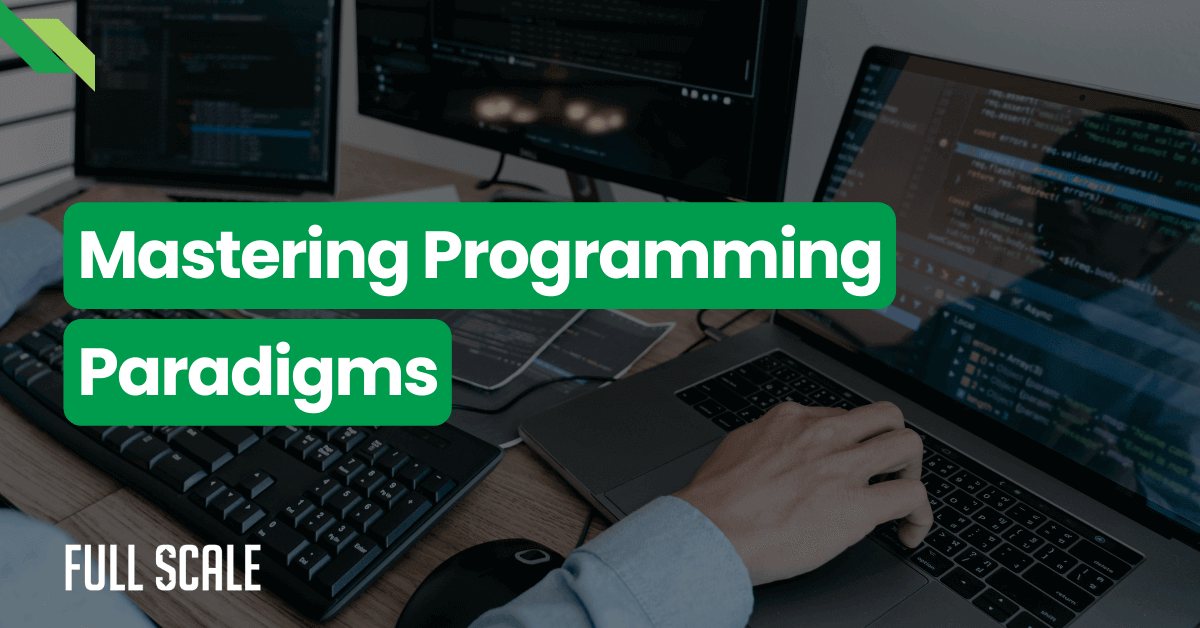Last Updated on 2025-10-01
Your project may succeed or fail, depending on your programming paradigm.
As a chief technology officer or startup owner, understanding the various programming paradigms and their implications is crucial to building a successful software product.
This article will explore different programming paradigms, their advantages and disadvantages, and provide real-world examples to help you make informed decisions for your next development project.
What is a Programming Paradigm?
A programming paradigm is a fundamental style or approach to efficiently writing code and structuring software.
It’s a way of thinking about and organizing the building blocks of a program, such as variables, functions, and objects.
Each paradigm has its own set of rules, principles, and best practices that guide the development process.
Choosing the right programming paradigm is essential because it can significantly impact your software’s efficiency, maintainability, and scalability.
It can also influence the learning curve for your development team and the ease of collaboration among team members.
Popular Programming Paradigms
Let’s explore some of the most widely used programming paradigms and their characteristics:
1. Imperative Programming
Imperative programming is one of the oldest and most straightforward paradigms. It describes how a program operates, step by step, using statements that change the program’s state.
| Advantages | Disadvantages |
| – Easy to understand and learn – Directly corresponds to machine instructions – Efficient for low-level tasks and system programming | – Can become complex and difficult to maintain as the program grows – Less modular and reusable compared to other paradigms – Prone to side effects and unintended consequences |
Example: Assembly language, C
Imagine you want to calculate the sum of numbers from 1 to 10. In imperative programming, you would provide step-by-step instructions to the computer to perform this task.
#include <stdio.h>
int main() {
int total = 0;
for (int i = 1; i <= 10; i++) {
total += i;
}
printf("The sum of numbers from 1 to 10 is: %d\n", total);
return 0;
}
We use imperative programming in C to calculate the sum of numbers from 1 to 10.
We initialize a variable total to store the sum and use a for loop to iterate through the numbers, adding each number to totalprintf.
2. Procedural Programming
Procedural programming is an extension of imperative programming that organizes code into reusable procedures or functions.
| Advantages | Disadvantages |
| – Promotes code reusability and modularity – Easier to debug and maintain than imperative programming – Supports top-down design and stepwise refinement | – Can lead to complex and deeply nested function calls – Data and functions are separate, which can make the code less intuitive – Limited support for data abstraction and encapsulation |
Example: C, Pascal, FORTRAN
Let’s say you want to calculate the area and perimeter of a rectangle. In procedural programming, you would define functions to encapsulate the logic for each calculation.
#include <stdio.h>
float calculate_area(float length, float width) {
return length * width;
}
float calculate_perimeter(float length, float width) {
return 2 * (length + width);
}
int main() {
float length = 5.0;
float width = 3.0;
float area = calculate_area(length, width);
float perimeter = calculate_perimeter(length, width);
printf("Area: %.2f\n", area);
printf("Perimeter: %.2f\n", perimeter);
return 0;
}
In this procedural programming example in C, we define two functions: calculate_area and calculate_perimeter.
These functions take the length and width of a rectangle as parameters and return the calculated area and perimeter, respectively.
In the main function, we call these functions with specific length and width values and print the results using printf.
3. Functional Programming
Functional programming treats computation as evaluating mathematical functions and avoids changing state and mutable data.
| Advantages | Disadvantages |
| – Encourages a declarative and expressive coding style – Minimizes side effects and makes the code more predictable – Supports lazy evaluation and infinite data structures – Facilitates parallel and concurrent programming | – Steep learning curve for developers unfamiliar with the paradigm – Can be less efficient than imperative programming for certain tasks – Requires a shift in thinking from traditional programming approaches |
Example: Haskell, Lisp, Erlang
Suppose you have a list of numbers and want to square each number and then find the sum of the squared numbers. In functional programming, you would use functions and avoid mutable states.
square :: Int -> Int
square x = x ^ 2
squareAndSum :: [Int] -> Int
squareAndSum xs = sum (map square xs)
main :: IO ()
main = do
let numbers = [1, 2, 3, 4, 5]
let result = squareAndSum numbers
putStrLn $ "The sum of squared numbers is: " ++ show result
In this functional programming example using Haskell, we define two functions: square and squareAndSum. The square function takes an integer x and returns its square.
The squareAndSum function takes a list of integers xs, applies the square function to each element using map, and then calculates the sum of the squared numbers using sum.
In the main function, we define a list of numbers, call the squareAndSum function with that list, and print the result using putStrLn.
4. Declarative Programming
Declarative programming focuses on what the program should accomplish without specifying how to do it.
| Advantages | Disadvantages |
| – Expressive and concise code – Easier to reason about and understand the program’s behavior – Supports domain -specific languages and problem-solving at a higher level of abstraction | – Can be less efficient than imperative programming – May require more advanced language features and runtime support – Limited control over low-level details and optimizations |
Example: SQL, HTML, Prolog
Let’s consider the same example of squaring numbers and finding their sum. In declarative programming, you focus on what needs to be done rather than how to do it.
SELECT SUM(number * number) AS sum_of_squares
FROM (
SELECT unnest(ARRAY[1, 2, 3, 4, 5]) AS number
) AS numbers;
We use a single SQL query to calculate the sum of squared numbers. We generate a table of numbers using the unnest function with an array of numbers.
We then use the SUM aggregate function to calculate the sum of the squares of each number. The result is aliased as sum_of_squares.
5. Object-Oriented Programming (OOP)
Object-oriented programming organizes code into objects that encapsulate data and behavior, promoting modularity and code reuse.
| Advantages | Disadvantages |
| – Encourages modular and reusable code – Supports data abstraction, encapsulation, and inheritance – Facilitates the modeling of real-world entities and their interactions – Widely adopted and supported by many programming languages | – Can lead to overly complex class hierarchies and design patterns – May introduce performance overhead due to dynamic dispatch and object creation – Requires careful design to avoid tight coupling and maintain flexibility |
Example: Java, C++, Python
Imagine you’re creating a program to manage a library. In OOP, you would define classes to represent entities such as books and libraries.
class Book {
private String title;
private String author;
public Book(String title, String author) {
this.title = title;
this.author = author;
}
public String getTitle() {
return title;
}
public String getAuthor() {
return author;
}
}
class Library {
private List<Book> books;
public Library() {
books = new ArrayList<>();
}
public void addBook(Book book) {
books.add(book);
}
public void displayBooks() {
for (Book book : books) {
System.out.println("Title: " + book.getTitle() + ", Author: " + book.getAuthor());
}
}
}
public class Main {
public static void main(String[] args) {
Library library = new Library();
Book book1 = new Book("Book 1", "Author 1");
Book book2 = new Book("Book 2", "Author 2");
library.addBook(book1);
library.addBook(book2);
library.displayBooks();
}
}
Using Java, we define two classes: Book and Library. The Book class represents a book with a title and an author, and provides getter methods for accessing these properties. The Library class represents a library that can store books. It has methods to add books and display the books in the library.
In the main method, we create an instance of the Library class called library. We then create two instances of the Book class, book1 and book2, with their respective titles and authors. We add these books to the library using the addBook method. Finally, we call the displayBooks method to print the details of all the books in the library.
Choosing the Right Paradigm for Your Project
With a solid understanding of the various programming paradigms, you might wonder how to choose the right one for your project. Here are a few factors to consider:
1. Problem Domain: Consider the nature of the problem you’re trying to solve. Some paradigms are better suited for certain domains, such as functional programming for data processing and declarative programming for query languages.
2. Team Skills: Consider the expertise and preferences of your development team. Choosing a paradigm that aligns with their skills can help reduce the learning curve and improve productivity.
3. Language and Ecosystem: Evaluate each paradigm’s programming languages and tools. Some languages are designed with a specific paradigm in mind, while others support multiple paradigms.
4. Performance and Scalability: Consider your software’s performance requirements and how well each paradigm can handle them. Some paradigms, like imperative programming, can offer better performance for low-level tasks, while others, like functional programming, can facilitate parallel and concurrent processing.
5. Maintainability and Extensibility: Consider your codebase’s long-term maintainability and extensibility. Paradigms that promote modularity, code reuse, and separation of concerns, such as object-oriented programming, can help create a more maintainable and adaptable software architecture.
Programming Paradigms with Full Scale Developers
At Full Scale, we have extensive experience working with various programming paradigms and can help you choose the right approach for your project.
Our team of skilled software developers is well-versed in imperative, procedural, functional, declarative, and object-oriented programming, allowing us to tailor our solutions to your specific needs.
Whether you’re a startup looking to build your first product or an established company seeking to scale your development efforts, Full Scale can provide the expertise and resources you need to succeed.
We offer various services, including software development, quality assurance, and project management, designed to help you achieve your goals efficiently and cost-effectively.
By partnering with Full Scale, you can tap into our deep understanding of programming paradigms and leverage our experience to make informed decisions for your software development projects.
We’ll work closely with you to understand your unique requirements and constraints and recommend the best programming paradigm and tools.
Let’s work together to unlock the power of programming paradigms and create software that makes a difference.
Hire Software Developers

Matt Watson is a serial tech entrepreneur who has started four companies and had a nine-figure exit. He was the founder and CTO of VinSolutions, the #1 CRM software used in today’s automotive industry. He has over twenty years of experience working as a tech CTO and building cutting-edge SaaS solutions.
As the CEO of Full Scale, he has helped over 100 tech companies build their software services and development teams. Full Scale specializes in helping tech companies grow by augmenting their in-house teams with software development talent from the Philippines.
Matt hosts Startup Hustle, a top podcast about entrepreneurship with over 6 million downloads. He has a wealth of knowledge about startups and business from his personal experience and from interviewing hundreds of other entrepreneurs.




